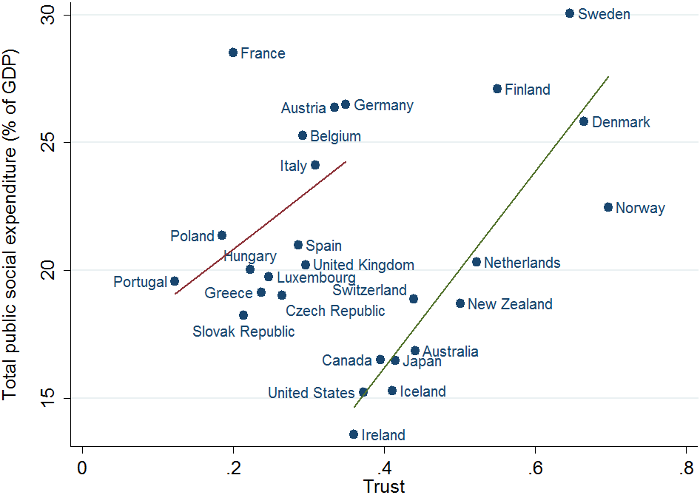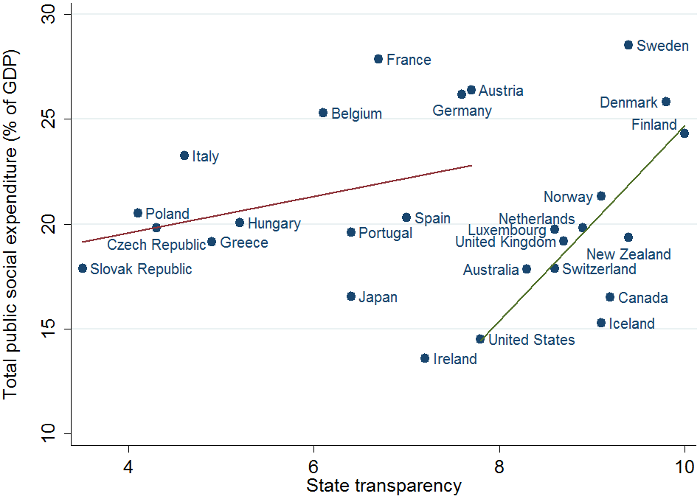It is commonly argued that the persistence of large welfare states in Scandinavian countries is explained by the trustworthiness of their citizens. Those large welfare states presumably rely on conditional cooperation. Trustworthy, or ‘civic’ individuals consent to pay high rates of tax only because they are convinced that their compatriots are paying their taxes too, and not misusing social benefits (Rothstein and Uslaner 2005).
Actually, a glance at the data shows that this explanation can only be one part of a much broader story for the OECD countries. Figure 1 shows that the observed cross-country relationship between trust and the size of welfare states – measured by the share of social expenditure in GDP – is not monotonic, contrary to the traditional claim, but twin peaked. Although Austria, Belgium, France, Germany, and Italy display limited trust, their welfare states are as large as those of Scandinavian countries.
Figure 1. The twin-peaked relationship between the generosity of the welfare state and trust
Source: Algan et al. (2014).
Similarly, Figure 2 shows a twin-peaked relation between the transparency and the size of welfare states. This twin-peaked relation holds for various measures of the generosity of the welfare state, and a handful of measures of trust and trustworthiness – even when one controls for alternative variables – ethnic segmentation, democracy score, and real GDP per capita – that have been found to influence the size of the welfare state.
Figure 2. The twin-peaked relationship between the generosity of the welfare state and perceptions of state transparency
Source: Algan et al. (2014).
In Algan et al. (2014), we show that the interplay between two opposing forces leads to this twin-peaked relation.
- On one hand, uncivic people support large welfare states because they expect to benefit from them without bearing their costs.
- On the other hand, civic individuals support generous benefits and high taxes only when they are surrounded with people they trust.
In this context, large welfare states can exist in societies populated by a majority of untrustworthy individuals who cheat on social benefits and taxes, and where the share of civic citizens is nonetheless large enough to raise a significant amount of taxes. If the civic spirit of public officials mirrors that of the population, these large welfare states will also be corrupt. Conversely, the welfare state can be both large and transparent, but only if the share of trustworthy individuals is very large.
We explore the empirical relevance of this explanation by using international social surveys.
- From the European Social Survey, we find that individuals exhibit a stronger support for the welfare state when they are surrounded with more people they trust.
- From the World Values Survey, we find that untrustworthy individuals support the welfare state more strongly than civic ones.
In particular, individuals who declare that it may be excusable to claim government benefits to which they are not entitled or to avoid a fare on public transport are found to support more generous social programs than trustworthy individuals who declare that there is no justification for cheating.
These findings might explain why it is so difficult to reform the large welfare states of several continental European countries, despite the widespread consensus that they are less effective and transparent than the welfare states of Nordic countries. Their large size might be sustained by an equilibrium in which the majority of the population is made up of untrustworthy individuals who exploit the advantages provided by the welfare state at the expense of a minority of trustworthy individuals. The long-run sustainability of this equilibrium is, however, an open question.
The fact that all individuals – either trustworthy or untrustworthy – are better off when they are surrounded by trustworthy individuals suggests that all individuals could coordinate to invest in education in order to improve the civic spirit of their offspring, to the extent that education can improve civic spirit (see Glaeser et al. 2007 and Algan et al. 2013). This should improve the effectiveness and the transparency of the welfare state. However, there are also opposing forces at play. Generous welfare states provide numerous individuals with incentives to abuse social benefits and to evade taxation, which can undermine civic attitudes (Ljunge 2012).
References
Algan, Yann, Pierre Cahuc and Marc Sangnier (2014), “Trust and the Welfare State: The Twin Peaks Curve”, forthcoming, Economic Journal.
Algan, Yann, Pierre Cahuc and Andrei Shleifer (2013), “Teaching Practices and Social Capital”, American Economic Journal: Applied Economics, 5(3): 189–210.
Glaeser, Edward, Giacomo Ponzetto and Andrei Shleifer (2007), “Why does democracy need education?”, Journal of Economic Growth, 12(2): 77–99.
Ljunge, Martin (2012), “The Spirit of the Welfare State? Adaptation in the Demand for Social Insurance”, Journal of Human Capital, 6(3): 187–223.
Rothstein, Bo and Eric M Uslaner (2005), “All for All: Equality, Corruption, and Social Trust”, World Politics, 58(1): 41–72.







